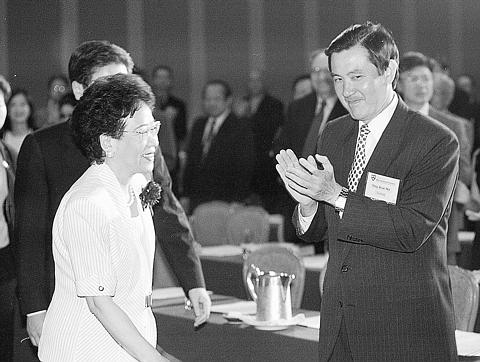Vice President Annette Lu
"Meaningful partnership can be achieved only through trust and consent ? I call for a Union of Asian States, then, to be brought about not by the force of arms, but by the forces of goodwill; not by subjugation, but by cooperation and mutual respect," she said.
Lu made her remarks at the opening ceremony of the Association of Harvard University Alumni Clubs of Asia (AHUACA,

PHOTO: FANG PIN-CHAO, LIBERTY TIMES
"We're all brothers and sisters, and we are all neighbors," she said. "More extensive social, cultural and economic exchanges between our countries would strengthen the values of democracy, tolerance and respect for human rights throughout the region."
While Lu's straightforward manner of speaking has sparked strong criticism from China, she said her call for unification may surprise many.
"Whether it is `one China' or not is not the real issue. Rather, the question is what is the relationship between Taiwan and China, and what would bring the most benefit to the people on both sides," she said.
Talking about China's recent barrage of vitriolic attacks on her, Lu said the message was clear.
"First, as an outspoken woman and the first woman vice president in both Taiwanese and Chinese history, I am unacceptable to them in their patriarchal conceptions of society," she said.
"But most importantly, the attacks on me reveal a fundamental flaw in Beijing's thinking: the singular focus of their nationalism is on territory rather than on people," she said.
In the modern era, efforts to achieve union by military means are simply self-defeating, Lu said.
Some 200 Harvard graduates from over 10 Asian countries and the US participated in the meeting.
Among the local alumni attending yesterday's ceremony were Taipei City Mayor Ma Ying-jeou (
Ma was dubious about the feasibility of Lu's Asian union idea.
"It seems a sound proposal but it's rather difficult to emulate as Asian countries differ in nature," he said. "There have been many other regions trying to follow suit over the past 50 years, but most of them failed mainly due to historic and cultural differences."

DAREDEVIL: Honnold said it had always been a dream of his to climb Taipei 101, while a Netflix producer said the skyscraper was ‘a real icon of this country’ US climber Alex Honnold yesterday took on Taiwan’s tallest building, becoming the first person to scale Taipei 101 without a rope, harness or safety net. Hundreds of spectators gathered at the base of the 101-story skyscraper to watch Honnold, 40, embark on his daredevil feat, which was also broadcast live on Netflix. Dressed in a red T-shirt and yellow custom-made climbing shoes, Honnold swiftly moved up the southeast face of the glass and steel building. At one point, he stepped onto a platform midway up to wave down at fans and onlookers who were taking photos. People watching from inside

A Vietnamese migrant worker yesterday won NT$12 million (US$379,627) on a Lunar New Year scratch card in Kaohsiung as part of Taiwan Lottery Co’s (台灣彩券) “NT$12 Million Grand Fortune” (1200萬大吉利) game. The man was the first top-prize winner of the new game launched on Jan. 6 to mark the Lunar New Year. Three Vietnamese migrant workers visited a Taiwan Lottery shop on Xinyue Street in Kaohsiung’s Gangshan District (崗山), a store representative said. The player bought multiple tickets and, after winning nothing, held the final lottery ticket in one hand and rubbed the store’s statue of the Maitreya Buddha’s belly with the other,

‘COMMITTED TO DETERRENCE’: Washington would stand by its allies, but it can only help as much as countries help themselves, Raymond Greene said The US is committed to deterrence in the first island chain, but it should not bear the burden alone, as “freedom is not free,” American Institute in Taiwan Director Raymond Greene said in a speech at the Institute for National Defense and Security Research’s “Strengthening Resilience: Defense as the Engine of Development” seminar in Taipei yesterday. In the speech, titled “Investing Together and a Secure and Prosperous Future,” Greene highlighted the contributions of US President Donald Trump’s administration to Taiwan’s defense efforts, including the establishment of supply chains for drones and autonomous systems, offers of security assistance and the expansion of

STREAMLINED: The dedicated funding would allow the US to transfer equipment to Taiwan when needed and order upgraded replacements for stockpiles, a source said The US House of Representatives on Thursday passed a defense appropriations bill totaling US$838.7 billion, of which US$1 billion is to be allocated to reinforcing security cooperation with Taiwan and US$150 million to replace defense articles provided to the nation. These are part of the Consolidated Appropriation Act, which the US House yesterday passed with 341 votes in favor and 88 against. The act must be passed by the US Senate before Friday next week to avoid another government shutdown. The US House Committee on Appropriations on Monday unveiled the act, saying that it allocates US$1 billion for the Taiwan Security Cooperation Initiative